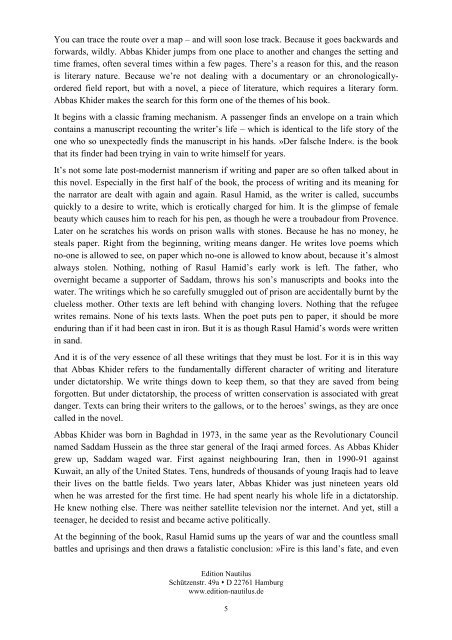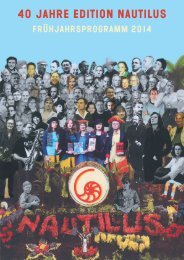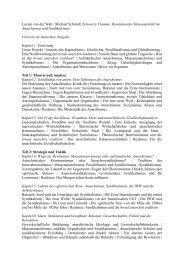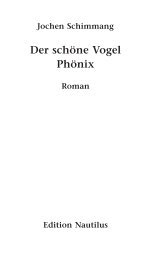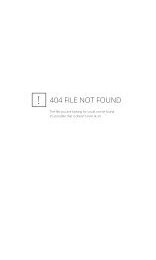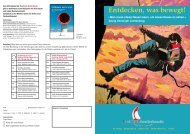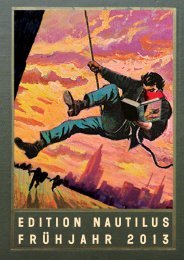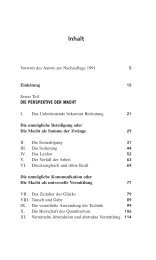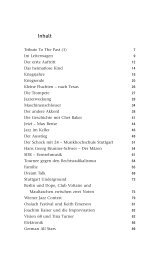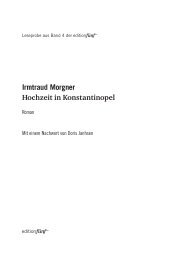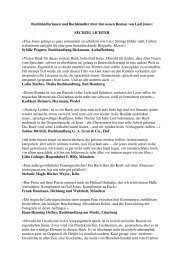Addional information on Abbas Khider
Addional information on Abbas Khider
Addional information on Abbas Khider
Create successful ePaper yourself
Turn your PDF publications into a flip-book with our unique Google optimized e-Paper software.
You can trace the route over a map – and will so<strong>on</strong> lose track. Because it goes backwards and<br />
forwards, wildly. <strong>Abbas</strong> <strong>Khider</strong> jumps from <strong>on</strong>e place to another and changes the setting and<br />
time frames, often several times within a few pages. There’s a reas<strong>on</strong> for this, and the reas<strong>on</strong><br />
is literary nature. Because we’re not dealing with a documentary or an chr<strong>on</strong>ologicallyordered<br />
field report, but with a novel, a piece of literature, which requires a literary form.<br />
<strong>Abbas</strong> <strong>Khider</strong> makes the search for this form <strong>on</strong>e of the themes of his book.<br />
It begins with a classic framing mechanism. A passenger finds an envelope <strong>on</strong> a train which<br />
c<strong>on</strong>tains a manuscript recounting the writer’s life – which is identical to the life story of the<br />
<strong>on</strong>e who so unexpectedly finds the manuscript in his hands. »Der falsche Inder«. is the book<br />
that its finder had been trying in vain to write himself for years.<br />
It’s not some late post-modernist mannerism if writing and paper are so often talked about in<br />
this novel. Especially in the first half of the book, the process of writing and its meaning for<br />
the narrator are dealt with again and again. Rasul Hamid, as the writer is called, succumbs<br />
quickly to a desire to write, which is erotically charged for him. It is the glimpse of female<br />
beauty which causes him to reach for his pen, as though he were a troubadour from Provence.<br />
Later <strong>on</strong> he scratches his words <strong>on</strong> pris<strong>on</strong> walls with st<strong>on</strong>es. Because he has no m<strong>on</strong>ey, he<br />
steals paper. Right from the beginning, writing means danger. He writes love poems which<br />
no-<strong>on</strong>e is allowed to see, <strong>on</strong> paper which no-<strong>on</strong>e is allowed to know about, because it’s almost<br />
always stolen. Nothing, nothing of Rasul Hamid’s early work is left. The father, who<br />
overnight became a supporter of Saddam, throws his s<strong>on</strong>’s manuscripts and books into the<br />
water. The writings which he so carefully smuggled out of pris<strong>on</strong> are accidentally burnt by the<br />
clueless mother. Other texts are left behind with changing lovers. Nothing that the refugee<br />
writes remains. N<strong>on</strong>e of his texts lasts. When the poet puts pen to paper, it should be more<br />
enduring than if it had been cast in ir<strong>on</strong>. But it is as though Rasul Hamid’s words were written<br />
in sand.<br />
And it is of the very essence of all these writings that they must be lost. For it is in this way<br />
that <strong>Abbas</strong> <strong>Khider</strong> refers to the fundamentally different character of writing and literature<br />
under dictatorship. We write things down to keep them, so that they are saved from being<br />
forgotten. But under dictatorship, the process of written c<strong>on</strong>servati<strong>on</strong> is associated with great<br />
danger. Texts can bring their writers to the gallows, or to the heroes’ swings, as they are <strong>on</strong>ce<br />
called in the novel.<br />
<strong>Abbas</strong> <strong>Khider</strong> was born in Baghdad in 1973, in the same year as the Revoluti<strong>on</strong>ary Council<br />
named Saddam Hussein as the three star general of the Iraqi armed forces. As <strong>Abbas</strong> <strong>Khider</strong><br />
grew up, Saddam waged war. First against neighbouring Iran, then in 1990-91 against<br />
Kuwait, an ally of the United States. Tens, hundreds of thousands of young Iraqis had to leave<br />
their lives <strong>on</strong> the battle fields. Two years later, <strong>Abbas</strong> <strong>Khider</strong> was just nineteen years old<br />
when he was arrested for the first time. He had spent nearly his whole life in a dictatorship.<br />
He knew nothing else. There was neither satellite televisi<strong>on</strong> nor the internet. And yet, still a<br />
teenager, he decided to resist and became active politically.<br />
At the beginning of the book, Rasul Hamid sums up the years of war and the countless small<br />
battles and uprisings and then draws a fatalistic c<strong>on</strong>clusi<strong>on</strong>: »Fire is this land’s fate, and even<br />
Editi<strong>on</strong> Nautilus<br />
Schützenstr. 49a � D 22761 Hamburg<br />
www.editi<strong>on</strong>-nautilus.de<br />
5


